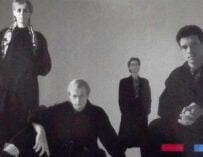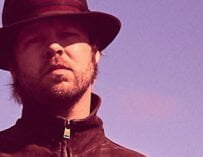
The Levellers: “The criminal behaviour of the police force in this country is shocking”
Celebrating their 30th anniversary, the punk-folk-rock band’s frontman and songwriter talks about his mysterious craft, finding inspiration, and undercover police
The Levellers formed in Brighton in 1988, forging a musical style influenced by punk rock and traditional English folk. Led by guitarist and singer Mark Chadwick, the band quickly built a loyal following and by 1993 their third album Levellers had entered the UK charts at No 2. The follow-up Zeitgeist would become the band’s first and only chart-topping album, but 1997’s Mouth To Mouth provided them with one of their biggest hit singles in What A Beautiful Day.
The band continues to record and tour consistently, with Mark still at the helm. This year saw them release their eleventh studio album We The Collective, which entered the UK album charts at No 12 – the band’s highest charting entry in over 21 years.
With The Levellers celebrating their third decade of making and performing music, we took the opportunity to catch up with Mark to get his forthright opinions on the craft of songwriting, and choosing to write about undercover police…
We also got Mark to tell us the story of how he wrote What A Beautiful Day in the Spring 2018 edition of Songwriting Magazine
Have you really been touring all these years?
“We haven’t stopped, no, we’ve never stopped! We keep going, we release an album every couple of years. We’re constantly writing new material.”
Did you have any idea that songs like One Way and What A Beautiful Day were going to have such an impact?
“No idea! No concept of it at all. It was just writing for writing’s sake. I write all the time, I don’t stop. I love it. It’s a fascinating and endless pool of ideas and thoughts. I give talks on songwriting because I’m so enthusiastic about it. So yeah, I’m constantly writing, but I’m not looking to write the next anthem or the next pop song, or the next song like that one I did previously. I’m always trying to write something new, and that’s a massive challenge.”
What’s your ideal situation for songwriting?
“My favourite way of writing songs is when someone comes up to me with a subject. They say, ‘Mark, have you thought about writing a song about this story?’ and a lightbulb suddenly comes on in my head. Then I get it. It’s the best way, I love it! Instead of pulling it out of grey matter, I’ve got a head start, which I love.”
Was your last recent single Drug Bust McGee like that?
“Yeah, with I really wanted to write a song about that particular subject: undercover police. It’s affected our lives quite a lot over the years, because we’ve been investigated and stuff. I’ve talked to Special Branch and I have encountered undercover police, trying to investigate the Levellers, so it’s all connected. I’ve always wanted to write it, but I wanted to write it in a bittersweet way, because it’s quite a dark subject.
“The criminal behaviour of the police force in this country is shocking – them investigating criminals in a criminal way. When it all came out, certain undercover police – not necessarily the ones that investigated us – were actually forming relationships and having babies with innocent women. It hasn’t been fully explored and taken to task, and it should be. But, as a band, we’re not afraid to face issues that are quite dark. A lot of people don’t because they want to sing about love and shit. Although Drug Bust McGee is a love song, but the wrong kind of love!
In the music video, you can see a folder with ‘Mr C’s Songwriting Notes’ written on the front. Were those genuinely your notes or just a prop?
“Yeah they’re mine. Up until they’re recorded, they’re forever changing because I want to get the meter right and I want them to chime well. The subject matter will never alter, but the way I put it across will change. Once it’s recorded with the lead vocal, it’s set in concrete and I’m happy with that, but until that point they’re not set in stone.
“YOU’RE THE LAST PERSON TO DECIDE WHETHER IT’S GOOD OR NOT”
So what sort of stuff goes into your notes?
“I’m making notes on my phone all the time. If I hear a line, or somebody says something, I’ll write it down. And when I’m in a situation where I’m allowed to sit down and peacefully write a song, I’ll come up with a chord progression and a melody, then flick through my notes and find something that’ll fit. Or something will come out anyway, because I’ll often sing nonsense words – or I think they’re nonsense – and I’ll listen back and I’ve actually sung a song. I’m like, ‘Hang on there, you’re actually talking about something quite important there Mark,’ because I’m not present at that moment. It still might be nonsense or it might be good.”
But how do you tell the difference?
“There’s no way of telling until I play it to someone else. You can’t predict these things and I’ve always kept my mind towards songwriting and I make time to write. I don’t nail it down to one particular experience. One thing I do know is: the more you do it, the better you get. But that doesn’t necessarily mean your song is going to chime with your audience. It doesn’t matter; you can write an ‘expert’ song, and then you can write a piece of shit and people will love that. You’re the last person to decide whether it’s good or not.”

The Levellers’ Mark Chadwick: “The mystery has to remain in songwriting, otherwise everyone will be at it”
When we met you at Camp Bestival in 2013, you talked about how you enjoyed mentoring people and running workshops. Do you still do that?
“Occasionally, yeah. Absolutely. I’m doing that with someone’s album at the moment, helping him out – I’m not going to say who it is. He’s sending me songs and I’m just giving him notes. But I’ve realised that there’s a certain point when, like children, you’ve got to let them go! I’ve given them enough notes that they can just get on with it now. I’m like, ‘Just do it, have a little bit of confidence in yourself.’ I think that’s quite an important thing, and that’s what I try to engender: confidence. I think songwriting suffers greatly under analysis; it’s too broad a subject. You can get a snare drum, start hitting it and just chanting, and that’s a song. It’s as simple as that.”
Is it that you don’t want to dispel the mystery and lose the magic?
“Absolutely. For example, take Michael Jackson – probably the greatest songwriter of all time. But do I know whether he wrote all of them or not? I don’t, but there’s a broad spectrum of incredible songs there, they are brilliant. It doesn’t matter. The mystery has to remain in songwriting, otherwise everyone will be at it, and then I’ll be out of job!”
Do you think we’re trying to put you out of a job?
“Oh no, I’m only joking. I think everybody’s got a song in them. I know that.”
What advice would you give to anyone who wants to put that to the test?
“Yeah. Most people are scared of writing a song, because it’s like writing a book: you need to start with a blank piece of paper. You’ve got your guitar with an average tuning, or a piano, in front of you, right? If you’ve got your guitar in E-A-D-G-B-E, drop the low E string to D, and start again. And suddenly you’ll find something you didn’t even know was there. If you’re a piano player, just drop down an octave or raise an octave. You get into so many habits, so if you’re not getting anything interesting on the guitar, open tunings are fantastic. Suddenly you can write a whole album, because you’re discovering all these new chord sequences. They’re actually normal chord sequences, but they’re new to you. It surprises you, so the blank page suddenly has colour.”



































Related Articles